Remembering bell hooks
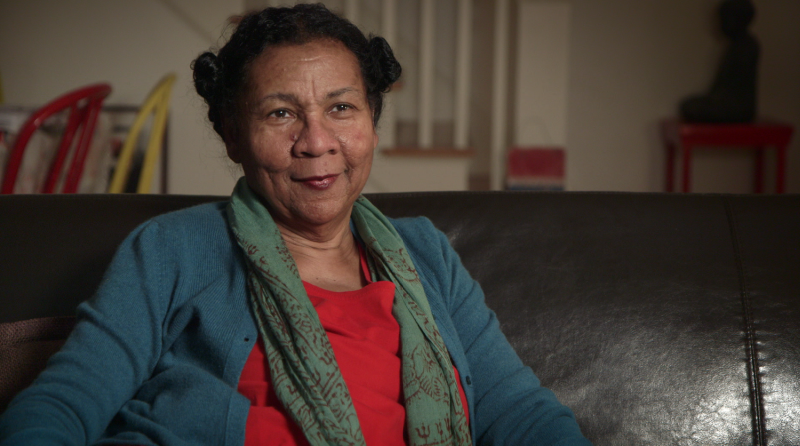
bell hooks — author, teacher, Black feminist — died on Dec. 15, 2021. She spent much of her life in yonder places, seeking transformation for rural communities like Appalachia and beyond.
We asked some of our Rural Assembly friends and partners to reflect on what hooks’ life meant to them and their communities.
Daring us to love
bell hooks is a Constellation, lighting the path forward for you and me to love the places that raised us.
Raising our faces skyward, letting forgiveness wash our faces and compassion drench us to the bone. Past barreling into the future.
She, with her mischievous daring smile. Double-dog daring us to love.

— Diana Oestreich, author, activist, peacemaker
Remembering my neighbor, bell hooks
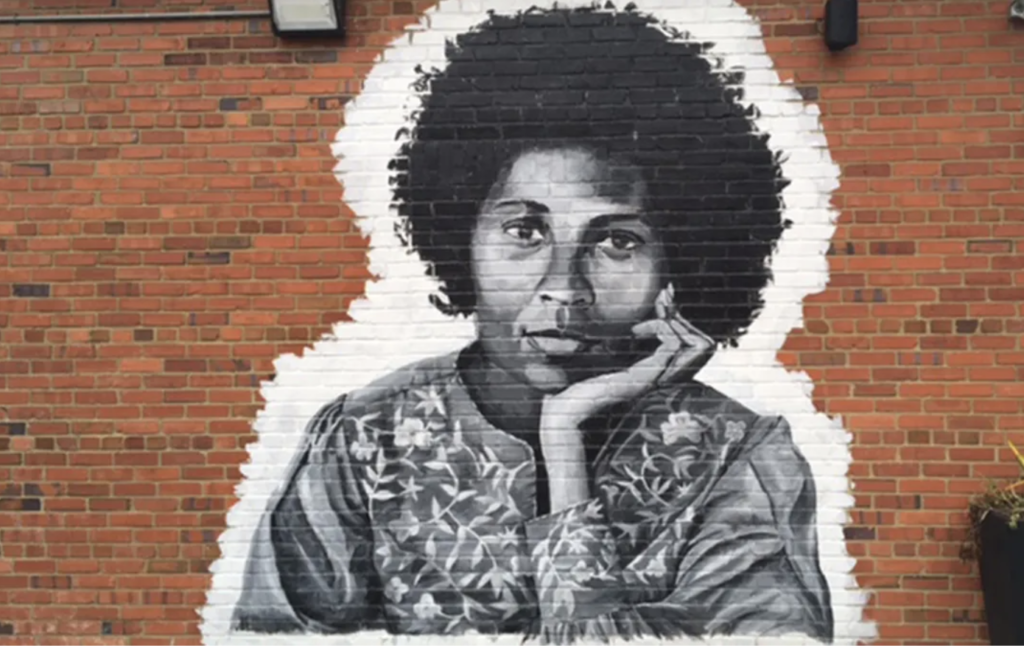
The first time I met bell hooks, I served her coffee. I was a barista at the local coffee shop in the Kentucky town we both called home.
As happens in small towns, our paths crossed in numerous ways. I occasionally bumped into her at the local bookstore as she fed her voracious appetite for mysteries. I attended her standing-room-only artist talk at the public library where she shared about her lesser-known pursuit of painting.
Most memorably, we would sometimes share a pew at my interdenominational church. She attended our mostly lily-White congregation and would punctuate the sermons with “Amen” and “Tell it” as she encouraged the pastor.
Always she was very much herself. Comfortable in her own skin. Outspoken. Friendly, and a bit feisty. Read more ….
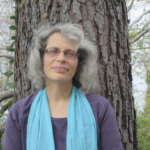 — Kim Kobersmith, excerpted from “Remembering My Rural Neighbor, bell hooks” published in the Daily Yonder
— Kim Kobersmith, excerpted from “Remembering My Rural Neighbor, bell hooks” published in the Daily Yonder
The brilliant and bewitching bell hooks
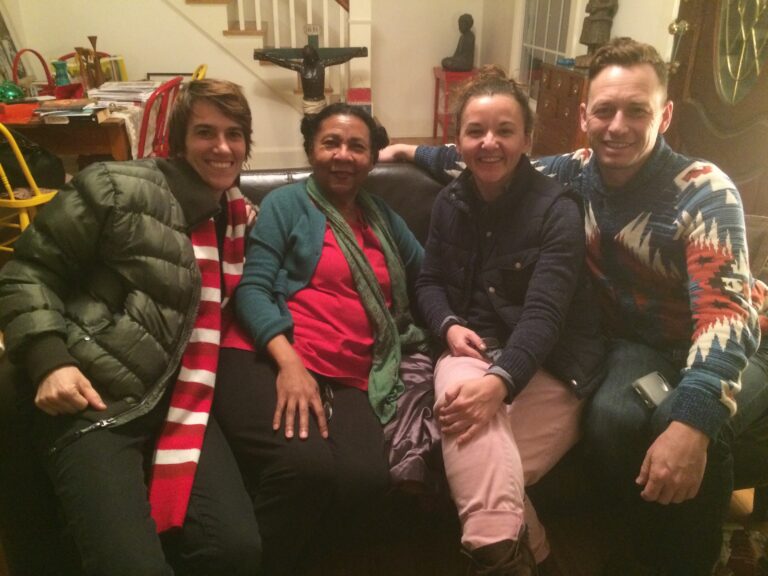
On January 11th 2015, bell hooks agreed to sit for a 15 minute interview for a documentary I was making about my personal experience growing up in rural Kentucky.
She was brilliant and bewitching as she spoke for more than 30 minutes about her experiences growing up in Hopkinsville, Kentucky; her sense of shared solidarity with the working class and Appalachian culture; and about media representations of poverty and the poor. It was one of the greatest experiences of my life interviewing her that evening alongside my co-director Sally Rubin and executive producer Silas House.
I first read bell’s work as an undergraduate student at the University of Kentucky in the fall of 1999. I was a journalism student and enrolled in a class called “Black Popular Culture,” a survey style course taught by a gifted new professor named Dr. Aimé Ellis who had just joined the English Department. Dr. Ellis assigned Outlaw Culture: Resisting Representations, a text that introduced me to the brilliant mind of bell hooks through a collection of her essays. Chapter 1: Power to the Pussy: We Don’t Want to be Dicks in Drag blew my mind. I had never read anything like it. bell’s incisive critiques about cultural hegemony and her radically unapologetic and searing rhetoric on topics ranging from Madonna to sexism and misogyny in rap music moved me deeply.
bell’s essays complicated my limited understanding of feminism and gave me a sophisticated understanding of its complexities. As a young journalist, her writing provoked me to be “critically vigilant about both what is being told to us and how we respond to what is being told.” She used the phrase “white supremacist capitalist patriarchy,” to contextualize the inextricably bound workings of domination, gender, and race. I was so inspired by these revolutionary and urgent ideas that I wanted to talk with everyone about patriarchy as a “political-social system.”
As I began a teaching practice of my own in my late 20s, I looked for ways to empower the students and challenge the traditions of academic learning. Teaching to Transgress offered an abundance of inspiration for letting the classroom serve as a space of endless potential. “When professors bring narratives of their experiences into classroom discussions it eliminates the possibility that we can function as all-knowing, silent interrogators. It is often productive if professors take the first risk, linking confessional narratives to academic discussions to show how experience can illuminate and enhance our understanding of academic material. But most professors must practice being vulnerable in the classroom, being wholly present in mind, body, and spirit … (1994, 21).”
In pre-production for Hillbilly, I read Belonging where I learned that bell was a fellow Kentuckian and also about the shared connection we both had as Kentucky natives who felt like unwanted outsiders and were ridiculed for the way we spoke when we moved away to college. “When we open our mouths, generations can be heard as though we are indeed speaking in tongue,” bell writes. “I learned to change my way of speaking, to keep the sound and cadences of Kentucky secret. Not speaking in the tongue of my ancestors was a way to silence ridicule about Kentucky.”
The last time I saw bell was five years ago; two days after the 2016 General Election when I returned to her home for a follow up interview. Despite feeling imminent doom from the results of the election, she looked forward with optimism and love. “I’m gonna hold to the hope that there’s a divine plan for the United States and that these next few years may be the actual unfolding of that plan and we don’t know,” she said. “That is why those of us who are interested in spirituality, cling to the primacy of mystery because there is so much we don’t know. And won’t it be better when we are actually concretely invigorated in protests and resistance to something the government is doing rather than through a kind of nebulous fear?”
bell teaches me over and over again that love and education are practices of freedom. I will forever be grateful to her for her teachings, which I am so excited to share with my two year old, Hazel, who has bell’s entire collection of children’s books.
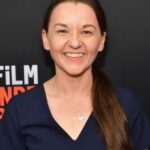 Ashley York was born and raised in Pikeville, Kentucky and currently lives in Los Angeles with her husband and two-year-old daughter, Hazel. Her most recent film, Appalachian Futures, features bell hooks and is screening in the Smithsonian FUTURES exhibit. Hillbilly is available on Hulu and Amazon.
Ashley York was born and raised in Pikeville, Kentucky and currently lives in Los Angeles with her husband and two-year-old daughter, Hazel. Her most recent film, Appalachian Futures, features bell hooks and is screening in the Smithsonian FUTURES exhibit. Hillbilly is available on Hulu and Amazon.
Why You Read bell hooks
Me and my friend, Chiamaka Alozie, were discussing bell hook’s book All About Love last night and how much of a journey it is to make through to the end. Every chapter packs a punch.
From learning in chapter one that though we’re born into parental hierarchy, domination and love do not live in the same house. Or how in chapter two you learn about honesty and how subconsciously we perpetually lie to convince ourselves we are worthy of it. It’s in our relationships, in our media, in our consumerism.
We learn through bell hooks that we may see ourselves as “good people” and simultaneously do harm. Reading bell hooks is a slow burn experience. I would offer a pull quote but there is no single sentence that could be drawn out, without pulling out the whole book with it.
I think my friend Chiamaka said it best, “There’s nothing to say because it’s [all] so simple, but there’s so much more to say because we’ve made it so complicated.”
And that’s why you read bell hooks. That’s why we remember her.
 — Xandr Brown, multimedia producer, The Daily Yonder
— Xandr Brown, multimedia producer, The Daily Yonder
Continually seeking
bell hooks reinforced for me the notion that we do not seek a set sense of belonging to a place – rather we shall continually seek out the never-ending, sometimes repetitive and circular journey, that is an active act of creating and making a culture of place. Rest in peace, and in your places, bell hooks.
 — Anna Claussen, Voices for Rural Resilience
— Anna Claussen, Voices for Rural Resilience







